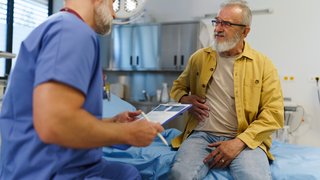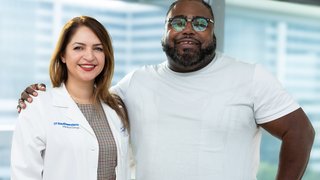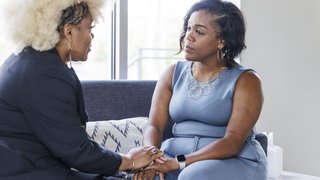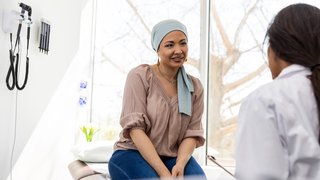Specialized care for young adults with colorectal cancer: What you need to know
February 13, 2026

Colorectal cancer in young people is rising at alarming rates. Though colorectal cancer was once considered an older person’s disease, about a third of the patients being treated today at Harold C. Simmons Comprehensive Cancer Center are in their 30s and 40s. Some are in their teens.
The number of patients under age 50 with colon cancer is expected to double by 2030, and rectal cancer rates are expected to quadruple in that same time frame. For those under age 50, colorectal cancer is now the leading cancer killer among men and second leading killer among women.
What’s causing this formidable cancer in the prime of life? And how will side effects from treatment – surgery, chemotherapy, radiation therapy, and immunotherapy – affect patients’ health and livelihood for the next 40-plus years?
Experts in the Early-Onset Colorectal Cancer Clinic at Simmons Cancer Center are on a mission to find out – and to connect young adults with effective treatment and practical care plans.
As the only North Texas clinic focused on colorectal cancer care for patients under 50, we bring together a team of specialists with the skills to help patients balance cancer treatment with the pressures of midlife. Young adults with colorectal cancer are often working full-time. Some are students or caregivers of aging loved ones. Many are parents or hoping to start a family one day.
All are blindsided by their diagnosis.
The days and weeks after an early-onset colorectal cancer diagnosis are crucial to making lifesaving – and potentially lifechanging – treatment decisions. But it’s also an overwhelming time when patients may feel at a loss for words or aren’t sure what to ask their health care providers.
Our experts understand the immediacy of colorectal cancer treatment as well as the emotional toll that early onset disease takes on young patients and families. So, we’ve gathered answers to some of the most pressing topics we discuss with our young adult patients.
Early Onset Colorectal Cancer: A Different Kind of Pandemic?
Emina Huang, M.D., discusses early onset colorectal cancer during the 2022 Carolyn P. Horchow Women’s Health Symposium at UT Southwestern Medical Center.
Why did I get cancer at a young age?
Researchers are investigating possible causes, such as environmental exposure, lifestyle choices, and inflammation – a key area of research in our labs. Known risk factors for early onset cancer include:
- A family history of colorectal cancer
- Overweight and obesity
- Lack of exercise
- Diet that is low in fiber and high in fat or processed meats
- Smoking
- Alcohol use
- Inflammatory bowel disease (such as ulcerative colitis and Crohn’s disease)
Environmental factors, such as water and air quality, are also being investigated. And there is a possibility that early-life exposures, such as antibiotic use as an infant and maternal nutrition, can eventually increase colorectal cancer risk.

Emina Huang, M.D., is studying early-onset colorectal cancer and its relationship with inflammation and ulcerative colitis. Patients with ulcerative colitis have a three to five times greater chance of developing colorectal cancer. We’re exploring this connection to better evaluate risk and develop targeted treatments.
Sometimes, early-onset colorectal cancer is caused by a genetic mutation, such as:
- Familial adenomatous polyposis (FAP): A genetic disorder that causes many growths, called polyps, to form in the colon and rectum, which can lead to cancer if not removed.
- Lynch syndrome: A genetic condition that increases the risk of developing several types of cancer, including colorectal cancer, at a younger age. However, tumors associated with Lynch syndrome often appear on the right side of the colon, while most tumors we see in young patients appear on the left side of the colon. Of all inherited colon cancer syndromes, Lynch syndrome is the most common.
- Gardner syndrome: A genetic disorder that leads to the development of multiple polyps in the colon and can increase the risk of colorectal cancer.
Our clinic offers genetic testing for key markers that can determine whether a cancer is genetic. We also connect patients with the Genetic Cancer Prevention Clinic to investigate whether family members are at increased risk of cancer and schedule proactive checkups with experts in specific gene mutations.
Related reading: Stiffer colon could signal risk of early-onset colorectal cancer
How is colorectal cancer diagnosed in younger patients?
The earlier we can find cancer, the easier it is to treat and achieve a complete cure. While the best way to identify colon cancer is a colonoscopy, insurance typically doesn’t cover the procedure for people under the recommended screening age of 45. However, if it were up to us, we’d recommend lowering the age to 35. While a screening colonoscopy may not be covered, a diagnostic colonoscopy (done for symptoms such as bleeding, change in bowel habits, etc.) is typically covered.
Patients who aren’t yet eligible for a colonoscopy may benefit from flexible sigmoidoscopy – a procedure to view the rectum and lower part of the colon, where cancers typically appear in younger patients. Flexible sigmoidoscopies generally cost less than colonoscopies and do not require a full bowel prep like a colonoscopy.
In July 2024, the U.S. Food and Drug Administration approved a blood test for colorectal cancers called Shield, which can detect DNA released by cancerous tumors into the bloodstream. Fecal immunochemical testing (FIT) is another option to detect traces of blood in the stool, which can be a sign of colorectal cancer.
Though screening can catch cancer early, patients often make appointments at the clinic after noticing symptoms associated with later-stage colorectal cancer, such as:
- Changes in bowel activity
- Bloating
- Rectal bleeding
- Diarrhea or constipation
- Abdominal pain
- Unexplained weight loss
About 40% of colorectal cancers are diagnosed after the cancer has spread to nearby tissues, lymph nodes, and organs; 20% are diagnosed after it spreads to distant parts of the body, which makes treatment more complex. Talk with a health care provider about any unusual bowel or digestive symptoms. Nearly 25% of rectal cancers have spread to other organs by the time of diagnosis.
What will treatment be like?

Treatment for early-onset colorectal cancer is typically more aggressive than treatment for older patients. Younger people generally can recover quicker and can usually handle more intense therapies. Our multidisciplinary specialists work together to provide holistic treatment approach, which may include:
- Surgery: Removal of the tumor and some nearby tissue.
- Chemotherapy: Medication that eliminates cancer cells throughout the body or slows their growth; it is often given after surgery for colon cancer and before surgery for rectal cancer.
- Radiation therapy: Focused, high-energy rays target cancer cells to shrink tumors before, after, or in place of surgery.
- Immunotherapy: These treatments help the immune system recognize and attack cancer cells, often by targeting specific proteins or boosting immune responses.
At the Early-Onset Colorectal Cancer Clinic, we combine surgery with other therapies for maximum effectiveness. Getting colorectal cancer surgery does not automatically require a permanent ostomy pouch to help the body remove waste. Patients who need one will get full support and personalized training for a smooth transition to living with an ostomy. The colorectal clinic at UT Southwestern hosts a young adult cancer support group and an ostomy support group for patients and caretakers of stomas.
Nutritional support
Eating a proper diet supports healing and can help reduce inflammation, which is associated with new and recurrent colorectal cancer. The Early-Onset Colorectal Cancer Clinic connects patients with registered dietitians and culinary medicine experts who help create healthy meal plans and nutrition goals that fit each patient’s care plan, dietary needs, and preferences.
UT Southwestern researchers are also involved in leading research on how the diversity of the gut microbiome – the bacteria living in your digestive tract – might be associated with colorectal cancer risk and outcomes, particularly among Hispanic populations. The gut microbiome is heavily influenced by the quality and fiber content of the food we eat. Understanding how to build and maintain the right balance of good bacteria may be key in the future of colorectal cancer prevention and treatment.
Access to clinical trials
Clinical trials offer cutting-edge treatments before they are widely available. UT Southwestern is currently participating in more than 50 clinical trials for colorectal cancer, and we were awarded four grants in 2024 to help break down barriers to participation:
- CPRIT Clinical Trials Network Award (RP220542) to increase clinical trial access across Texas.
- Clinical Trial Participation Award (RP210115), which helps cover participants’ nonmedical costs, such as transportation and lodging.
- Stand Up to Cancer Diversity in Early Clinical Trials Research Grant, to expand diversity in phase one and phase two trials.
- American Cancer Society Navigation Award, which helps patients understand a trial’s requirements and logistics.
Mental health support
Cancer doesn’t just affect the body; it also affects the mind. This is especially true for early-onset colorectal cancer patients, who have higher rates of body image issues, anxiety, and embarrassment around bowel movements than older patients.
The Early-Onset Colorectal Cancer Clinic provides streamlined access to psycho-oncology services to help patients adjust to a new cancer diagnosis, talk with their kids about cancer, and handle anxiety associated with possible recurrence.
Fitting treatment into daily life
From diagnosis through post-treatment, specially trained nurse navigators provide information and logistical support, such as managing appointments and referrals. They also answer questions about medical terms and details about treatment plans.
Especially for young patients, cancer creates an enormous financial strain. It can be difficult to miss work, which often results in lost wages, while health care expenses increase. Early-Onset Colorectal Cancer Clinic nurse navigators can connect you with financial support resources and help you work through the world of insurance and claims. They can also help you find support groups and communities to help you feel less alone.
Can I have a baby after colorectal cancer treatment?

Cancer treatment of the abdominal and pelvic area can reduce fertility by causing pelvic organ tissue damage, stopping egg production (women), and lowering sperm count or limiting sperm production (men).
Despite these risks, studies found that only 29% of men and 19% of women in the U.S. get fertility counseling prior to cancer treatment, though 44% of women reported being concerned about their reproductive well-being.
The Early-Onset Colorectal Cancer Clinic streamlines visits with gynecologists, urologists, fertility specialists, and oncologists to make sure patients are informed about their options. Patients may choose to freeze their sperm, ovarian tissue, or eggs for a future pregnancy. Our oncologists will discuss fertility-sparing treatment options such as:
- Shielding the reproductive organs during treatment
- Shifting the ovaries or uterus higher in the body during radiation therapy
- Ovarian suppression, or temporarily shutting down the ovaries to make them more resistant to the effects of chemotherapy
What will life be like after cancer treatment?
Being diagnosed with colorectal cancer at a young age can make patients anxious about the possibility of recurrence. Our team will personalize a follow-up plan for each patient, which often starts with 3- to 6-month visits to check on healing and look for signs of recurrence.
If the cancer comes back, we’ll be able to catch it and treat it quickly. Most patients continue to see us every three to six months, depending on their cancer, risk factors, and treatment type.
Early-onset colorectal cancer care requires special considerations and approaches that meet patients where they are in life. The Early-Onset Colorectal Cancer Clinic customizes treatment and support services to effectively treat cancer and enhance not only longevity but also quality of life.
To talk with a specialist about early-onset colorectal cancer care or prevention, call 214-645-8300 or request an appointment online.













